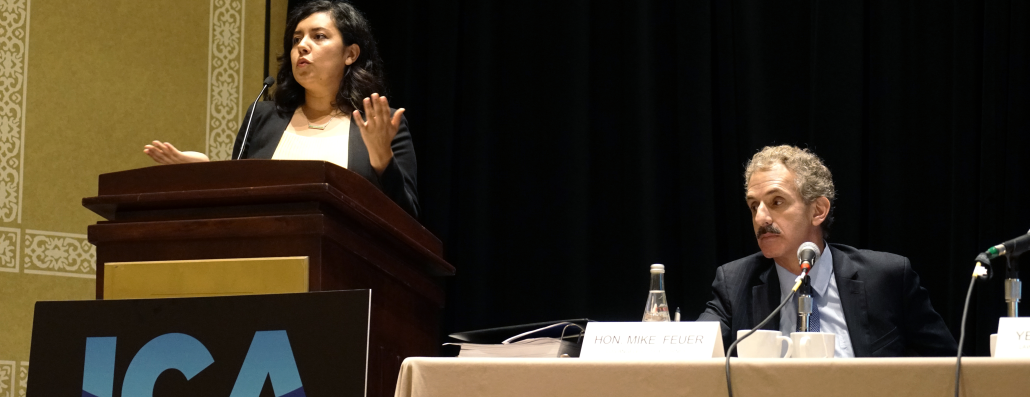[vc_row][vc_column][vc_column_text]One of the biggest topics leading today’s news is immigration, specifically, the issue of Sanctuary Cities. What exactly is a Sanctuary City and how will it benefit the American people? Let’s start with, defining a Sanctuary City. According to Wikipedia, the United States and Canada’s broad definition is, “a city that limits its cooperation with the national government effort to enforce immigration law.” So, now, how will it benefit the American people? Again I will quote Wikipedia,
Leaders of sanctuary cities want to reduce the fear of deportation and possible family break-up among people who are in the country illegally so that such people will be more willing to report crimes, use health and social services, and enroll their children in school. Municipal policies include prohibiting police or city employees from questioning people about their immigration status and refusing requests by federal immigration authorities to detain people beyond their release date, if they were jailed for breaking local law.Yesenia Acosta, Immigration Attorney at the Law Offices of Scott Warmuth and 2017 Super Lawyers’ Rising Star, recently presented alongside L.A. City Attorney Mike Feurer at the ICA Annual Seminar in Carlsbad to share their viewpoints on this hot topic of Sanctuary Cities. Attorney Acosta spoke about the effects of Sanctuary Cities from a private sector perspective, whilst City Attorney Feuer spoke about impacts in the public sector. Attorney Acosta provided insight as to the immigration law impacts, and how constituents are reacting to developments in this topic. This has become a divisive topic for cities that thrive on immigrants’ contributions in the economy and culture, yet face political pressure to ensure public safety by taking a tougher stance against undocumented immigrants, notes Attorney Acosta. She continued to explain that it became apparent at the conference the city officials were concerned that by taking the label of a sanctuary city, that they were viewed as providing harbor for unlawful activities to take place. A concern that Acosta wanted to make clear was that sanctuary cities were not about harboring criminal aliens or rebelling against federal requests, but rather about protecting constitutional rights of all their residents (yes, including undocumented residents) from policies and procedures that have been validly challenged in federal courts. City Attorney Feuer pointed out that the federal funding threatened only included three grants, and even that could only be impacted by a refusal to share information that was gathered by cities (which are not mandated to gather this info) on undocumented status of residents. As of now, there has been an injunction on the executive orders, and the future implementation of the orders has yet to be fully resolved. The seminar turned out to be a very timely and informative gathering of the minds for the honored guest as well as the association members which are made up of elected officials from different cities across Southern California. The elected officials wanted to know how to approach the topic from a legal and public perspective due to Trump’s recent executive orders announcing that federal funding would be cut for cities that the administration considered to be sanctuary cities. This remains an ongoing issue here in the United States, and could possibly continue to be for the remainder of the current Administration. Please share your viewpoints and concerns on this very important and crucial issue with us.[/vc_column_text][vc_column_text el_class="hidden"]Immigration has been a trending topic lately, particularly the issue of Sanctuary Cities. What exactly is a Sanctuary City and how will it benefit the American people? Let’s start by defining a sanctuary city. According to Wikipedia, the United States and Canada’s broad definition is, “a city that limits its cooperation with the national government effort to enforce immigration law”. Why would that benefit the American people?
Leaders of sanctuary cities want to reduce the fear of deportation and possible family break-up among people who are in the country illegally so that such people will be more willing to report crimes, use health and social services, and enroll their children in school. Municipal policies include prohibiting police or city employees from questioning people about their immigration status and refusing requests by federal immigration authorities to detain people beyond their release date, if they were jailed for breaking local law.Yesenia Acosta, immigration attorney at the Law Offices of Scott Warmuth and 2017 Super Lawyers' Rising Star, recently presented alongside L.A. City Attorney Mike Feurer at the recent Independent Cities Association (ICA) Annual Seminar in Carlsbad to share their viewpoints on the hot topic of sanctuary cities. Attorney Acosta spoke about the effects of Sanctuary Cities from a private sector perspective, whilst City Attorney Feuer spoke about impacts in the public sector. Attorney Acosta provided insight to the impact of immigration law and how constituents are reacting to developments of sanctuary cities. This has become a divisive topic for cities that thrive on immigrants’ contributions in the economy and culture, yet face political pressure to ensure public safety by taking a tougher stance against undocumented immigrants, notes Attorney Acosta. She continued to explain that it became apparent at the conference the city officials were concerned that by taking the label of a sanctuary city, that they were viewed as providing harbor for unlawful activities to take place. A concern that Acosta wanted to make clear was that sanctuary cities were not about harboring criminal aliens or rebelling against federal requests, but rather about protecting the constitutional rights of all their residents (including undocumented residents) from policies and procedures that have been challenged successfully in federal courts. City Attorney Feuer pointed out that the threats of reduced federal funding only affected three grants. The seminar turned out to be a very timely and informative gathering. ICA members are made up of elected officials from different cities across Southern California. The elected officials in attendance wanted to know how to approach the topic from a legal and public perspective due to President Trump’s recent executive orders announcing that federal funding would be cut for cities that the administration considered to be sanctuary cities. As of now, there is an injunction on executive orders targeting sanctuary cities and their future implementation has yet to be fully resolved. Please feel free to share your viewpoints and concerns with us by leaving a reply below.[/vc_column_text][/vc_column][/vc_row]








